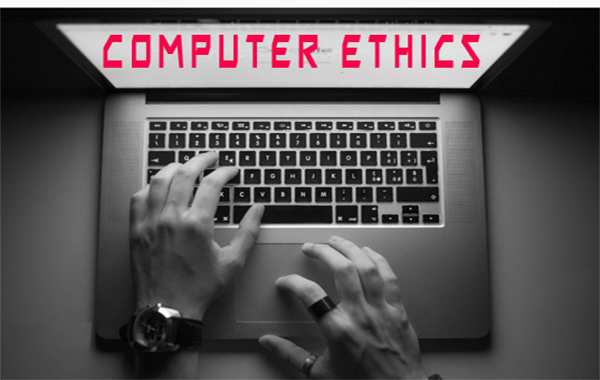To define computer ethics, we first need to understand what the word ethical means. Ethics is a branch of philosophy that aims to study the wrongness or rightness of human actions. Ethics is mainly focused on finding out questions of how human beings act in situations, whether right or wrong. The main goal of ethics is to attempt to seek the good through the aid of reason.
So, what is computer ethics? Computer ethics refers to a set of philosophical morals that govern an individual or a group of people on what are acceptable behaviors when using a computer. Some of the primary examples of ethical principles of computer ethics are. One, making copies of copyrighted content without the author’s consent.Pay attention to the fact that big monitor can boost your productivity. They are perfect for those who need to see more content on the screen at once.
Table of Contents
HISTORY OF COMPUTER ETHICS.
Computer ethics is continuing to grow every day as the internet barely arrived almost 20 years ago. The term computer ethics came around 1976 with the emerging birth of computers. Walter Maner made the term. In 1976 computers were now becoming integrated at homes. Privacy issues were becoming the norm. Issues like phishing, fraud, virus, malware, hacking and spamming were now spreading rapidly, and there was a need to set up ethical ways of working. Computer ethics, by itself, refers to various physiological aspects of ethics as well as psychological and sociological interpretations.
Many professors have written articles and books that outline the ethical codes and other ethical issues surrounding computer ethics. Today computer ethics is a module in schools where students taking computer studies have to learn this. Also, companies like Facebook are spearheading and championing for ethical rights. They even funded to build an ethics center at the Technical University of Munich, in Germany. All these developments in computer ethics have championed for safe, morally and socially accepted use of computers.
WHAT IS UNETHICAL BEHAVIOUR IN COMPUTER ETHICS?
Unethical behaviour in computer ethics includes Plagiarism, which refers to copying someone else work from online and then presenting it as your work. Plagiarism is the most common form of unethical behaviour that still happens today. Pirating content for free like downloading movies or music from online websites for free is unethical. Another wrong way of using the computer is computer hoax which is spreading false information through the use of computers. There is a recent emerging unethical behaviour, and that is digital manipulation which refers to altering any online text or even online pictures.
HOW HAS COMPUTER ETHICS IMPACTED HOW WE USE COMPUTERS IN SOCIETY?
Throughout society, with the increased use of the internet, some of the unethical behaviors are increasingly becoming popular. The practices like illegal copying of copyrighted content are a significant issue. Computer ethics has tried its best to help instill morals to computer users in stating that illegally copying the material is a crime. Laws have been put in place to help curb issues like hacking which are unethical and can cause harm to a person, whether physically or psychologically.
There is a case in the 1970s before computer ethics laws came into a place where a hacker hacked to a bank system. He was having debt and wanted to make the debt disappear from the bank records. He succeeds to do so but when he was arrested there were not yet rules to curb or convict him. Lack of the set laws meant the hacker was then let free. If the rules were not made early, that would mean more people would continue this behaviour. A set of laws were later coined that regulated how computer users use their computers.
THE IMPORTANCE OF COMPUTER ETHICS.
-
ENCOURAGE MORAL AND SOCIAL VALUES IN SOCIETY.
Moral and social values are so essential to living in society. We need to have ethical principles that guide us throughout our lives. There are several reasons through which ethically using a computer will encourage how morally we will live with people. Having good morals and social value has so many advantages. They help reflect an individual’s character and spirituality. Also, good morals help one be able to build a good relationship in personal and professional lives as well. Encouraging people to be able to curate their content or acquire someone’s content legally is what computer ethics is all about. Honesty, hard work, and respect for other people are instilled in people in society.
-
PROTECT PERSONAL AND COMMERCIAL INFORMATION.
With the increased use of computers, personal information nowadays is at risk. The information like passwords, credit card information and any other kind of information is readily available today. Identity thieves can now easily piece together your personal information and use it for malicious purposes. An example of this is the credit scammers’ activities that seem to never come to an end. Scammers can now easily duplicate people’s personal information quickly and steal from you.
This doesn’t have to be a threat, and you have the right to browse the internet freely. Computer ethics is, therefore, trying as much as setting up these laws to tell those doing wrong things online that isn’t the right thing. Rules set in place now are harsh to those breaking the conduct and be a warning to others.
-
HELP CONTROL THE USE OF COPYRIGHTED MATERIAL AND PLAGIARISM.
Piracy or unauthorized duplication of copyrighted content for a long time is becoming increasingly rampant. There are online markets that have been set up where prices of some of the material are available for free or sold at low prices. This activity may seem victimless, but it means the owners of the original content aren’t earning from it. When you plagiarize somebody’s content, you are taking it without proper permission. This is equivalent to stealing something from a person physically. This kind of vices are dishonest, and they should not be tolerated, and that’s why computer ethics enforce that the vices be abandoned.
-
ENCOURAGE FAIR COMPETITION IN BUSINESS.
In the business marketplace, their needs to be a free and fair competition for it to operate appropriately. Without fair competition among businesses, it can be hard for consumers to determine which products or services are right for them. With the internet being on the rise, some companies may abuse market positions or distort the marketplace. This can create an imbalance in the market that will cause dishonest business practices. Computer ethics, therefore, have tried to set up measures and in a way, encourage that business practice honest business and maintain fair competition in the market place.
-
MAKE YOUR COMPUTER A SAFE PLACE TO BE.
Most people are nowadays scared to leave their information on computers. Computers have significantly evolved, and they are not just devices but a place where you store your data. Data in today’s world is so valuable, and if it falls on the wrong hands, it can lead to attacks. Safety is now becoming a significant issue in the internet world. There are lots of people who their information has been used in blackmailing them. What computer ethics does is try to encourage people to avoid stealing other people’s data on their computers and then taking advantage. Blackmails have made people lose their money and even broken some relationships. Some companies have also been looted a lot of money just because some people are not ethically using the internet.
-
HELP PREVENT JOB LOSS.
There are lots of companies out there that use a computer a lot in the development. Software, games, animations and lots of other cool stuff are made with the help of machines. With the increase of piracy, therefore, that would mean most people can be accessing these games and software either free or so cheap. An increase in theft will consequently imply that these companies will now start to cut off some of its employees. This would be a high cost for the employes as they will soon lose their jobs. Unethical access to pirated software and games can hence result in the economy going down if these companies start going bankrupt. Computer ethics can, therefore, help instil these good vices in people and prevent job loss to many employees.
-
ENCOURAGE CREATIVITY IN COMPUTER DEVELOPMENT.
Computer ethics have been at the forefront in ensuring the increased development in computer and more creativity. People are feeling safe that their progress in the field of computer is now becoming more appreciated. Developers think that more people are now putting money and buying their games and software. Piracy has become curbed and minimal, and even some countries like China treat it as a big crime. Abolishing these vices has therefore led to increased creativity among developers, and this is all because of computer ethics.
-
HAS ENCOURAGED DEVELOPMENT IN EDUCATION.
With the development of computer and the internet, there has been increased development in global education too. Computers have greatly encouraged collaboration between students across the globe. Students can now work on different online tasks by collaborating on forums. Some studies have even shown that using computers has helped improve engagement. Students can now focus on studying subjects that interest him. If it weren’t for computer ethics, then this would not have been possible. Knowing that learning online is safe makes the students learn with ease compared to if there is a wrong thing that is going on.
-
DEVELOPMENT OF GLOBAL LAWS.
Several laws have been put up internationally all because of computer ethics. If someone wants to protect his or her freedom of speech online, then now that is possible. The laws can now apply from whatever country you are in. Unethical behaviors like spreading pornography, piracy have now reduced all because of the laws set in place. If a person if found dealing with these issues, then he/she can be tried in court. These global laws have immensely helped curb the behaviours and this dealing online thanks to computer ethics.
-
HELP KEEP IT PROFESSIONALS IN LINE.
There are many cases where we have heard of IT professionals turn into cybercriminals. With all the IT knowledge it is very tempting for the It guys to start committing cybercrimes. Students taking up IT as a profession, therefore, need to understand that they must take computer ethics as a module. Learning this will at least instil some ethics in them serve as a reminder that they should not commit anything that goes against the law. Computer ethics, therefore, is mandatory for any computing student, and that is why it’s crucial.
-
KEEP UP THE PACE ON THE EVER-CHANGING TECHNOLOGY.
The technology is continuously changing and evolving daily. Computer ethics has to come in place to help in wise decision making and while solving problems in the IT world. Therefore a proliferation of internet content is a must, and computer ethics cannot be underestimated here. This will strive to ensure that it stops potential future crimes.
CONCLUSION.
As noted above, it is crystal clear that computer ethics is so important in everyone in today’s age. The philosophy has managed to help guide people on how they should use computers ethically in their lives. Having a clear set of laws and measures to be taken in place will put people in line and help secure how the internet is used. Computer ethics, even in the future, will help prevent computer crimes, privacy, anonymity, freedom and intellectual property. People don’t have to be worried about security risks anymore. Being sure that your data is safe and that no one will tamper with it is the primary concern for computer ethics. Having good ethics in computing hence will result in less copyright infringement and piracy. Plagiarism will be reduced and more publication of honest materials.
A business will boom globally because of the fair, competitive market. The now increasing conducts of computer hoax will significantly reduce if people adhere to this ethics. The world does not have to produce more malicious hackers; preferably those who hack for good. Once again, people don’t have to question anymore about their safety online. All these are the benefits of having the computer ethics in place.








